
Community Med School:
A Study in Integrative Medicine and
Lifelong Learning

PRÉCIS
Purpose: Integrative medicine approaches in lifelong learning programs offer many opportunities that support health literacy and empowerment in health promotion. Lifelong learning classes in medicine, tai chi, yoga, pilates, meditation, art, music, literature, and other mind/body therapies have the potential to improve the health of millions of people.
Primary Objective – This study is intended to increase the evidence base of the effects of integrative medicine and mind/body approaches in lifelong learning on global health measures, cognitive function, and self-efficacy.
Secondary Objective – Closing the gap between world-class research and community health promotion efforts, we intend to share best practices and research data on integrative medicine approaches in health promotion. Making data available to others allows for replication and increasing statistical power. Data shall be shared internationally through, PROMIS Health Measures Scoring Service, Harvard Data-verse, and the Oxford International Roundtable.
 Design and Outcomes-
Design and Outcomes-
“If we want more evidence-based practice, we need more practice-based evidence.”
Traditional random controlled trials, study treatments in carefully selected populations under ideal conditions. This makes it difficult to translate results to the real world. Advances in information technology make time series analysis an increasingly useful method for studying human behavior in the real world. This type of longitudinal study can provide an understanding of the patterns of change over time in the natural processes of lifelong learning and integrative medicine in the community. This study will use a quasi-experimental time-series design and the RE-AIM framework to evaluate the public health impact of various interventions.
RE-AIM domains will use the following measures:
Reach – Sample Size and Population – the target population are older adults (50+) involved in lifelong learning, integrative medicine, and health promotion programs in the Denver metropolitan area.
Efficacy – Data collection  for the study will be conducted by a Qualtrics survey on the DU Qualtrics database. The primary, efficacy measure is the PROMIS-29 Profile (v2.1), A collection of 4-item short forms assessing anxiety, depression, fatigue, pain interference, physical function, sleep disturbance, and ability to participate in social roles and activities, pain, cognitive function, and self-efficacy. PROMIS measures have been successfully used to conduct research that helps participants make decisions about their own care. The reference population is the general population. Score metric (mean=50, SD=10) based on a sample representative of the 2000 US General Census with respect to important demographic variables (gender, age, race/ethnicity, education, marital status, and income). The study will look for meaningful change in scores among people over time.
for the study will be conducted by a Qualtrics survey on the DU Qualtrics database. The primary, efficacy measure is the PROMIS-29 Profile (v2.1), A collection of 4-item short forms assessing anxiety, depression, fatigue, pain interference, physical function, sleep disturbance, and ability to participate in social roles and activities, pain, cognitive function, and self-efficacy. PROMIS measures have been successfully used to conduct research that helps participants make decisions about their own care. The reference population is the general population. Score metric (mean=50, SD=10) based on a sample representative of the 2000 US General Census with respect to important demographic variables (gender, age, race/ethnicity, education, marital status, and income). The study will look for meaningful change in scores among people over time.
Adoption – Community Med School Integrative Medicine Research Network, Interventions, and Duration
The project will identify a network of stakeholders of existing community organizations, consumer-based networks, and academia to act as intermediaries to aid accrual. Referring physicians, community leaders, members of community or advocacy organizations, and practitioners will help support the study and in return, we will share information, keep them informed, and support training and capacity building in the community.
The following types of integrative medicine programs are eligible for inclusion:
- Exercise is Medicine Therapies – Yoga, Qi gong, Tai chi, Pilates, Hiking,
- Meditation – Present Centered Mindfulness, Guided imagery, Biofeedback, Progressive relaxation
- Integrative Mind/Body Therapies (The 5 excellences) – Art, Music, Literature classes
- Practitioner Based Therapies – Acupuncture, Ayurveda, Traditional healers, Chiropractic or osteopathic manipulation, Energy healing therapy/Reiki, Massage, Movement therapies,
- Diet-based therapies – Vegetarian diet-Natural products, such as herbs and other products.
Implementation – Participation organizations will be given a link to the survey database for their participants to use. The survey is designed to test the efficacy of lifelong learning on improving global health measures. It will take about ten minutes of your time. Participants will be asked to complete an initial survey followed by four additional surveys at 6, 12, 18, & 24 months over the next two years. Every participant receives a free subscription to The Barefoot Doctor’s Journal email newsletter for completing the study. It will help keep you informed about the latest findings in integrative medicine, reminders about the followup surveys for this study and details about lifelong learning events and offers in the community. Participants will be able to unsubscribe at any time and we will never share their information. We intend to find any significant measurable clinical differences over a two-year follow-up in participants that engage in self-selected, self-cultivation and health promotion activities.
Maintenance – Patient, self-reported data will be collected on-line at baseline, 6 months, one year, eighteen months and two years follow-up intervals.
Statistical considerations – Community medicine in situ
Considerable research supports the validity of PROMIS measures to assess the impacts of interventions and track changes in health over time. PROMIS measures are rigorously tested measurement tools that have greater precision than other measures thus enhancing power in smaller samples, decreasing floor and ceiling effects and is easier on subjects. Final outcome uses a common metric: the T-score (mean = 50, standard deviation = 10). In most cases, 50 equals the mean in the U.S. general population. This metric has also been linked to many other conventional measures, ensuring comparability across studies.
Sharing Data Across Sectors
Sharing best practices across sectors – Data from this study will be assembled into an online data verse repository where researchers can share, preserve, cite, explore, and analyze research data on integrative medicine approaches in community medicine. Data shall be and published in appropriate journal publications, and will be shared internationally through the PROMIS Health Measures Scoring Service, Harvard Dataverse, and the Oxford International Roundtable thus making the data available to others, and allowing replication of the work easier and increasing web visibility.